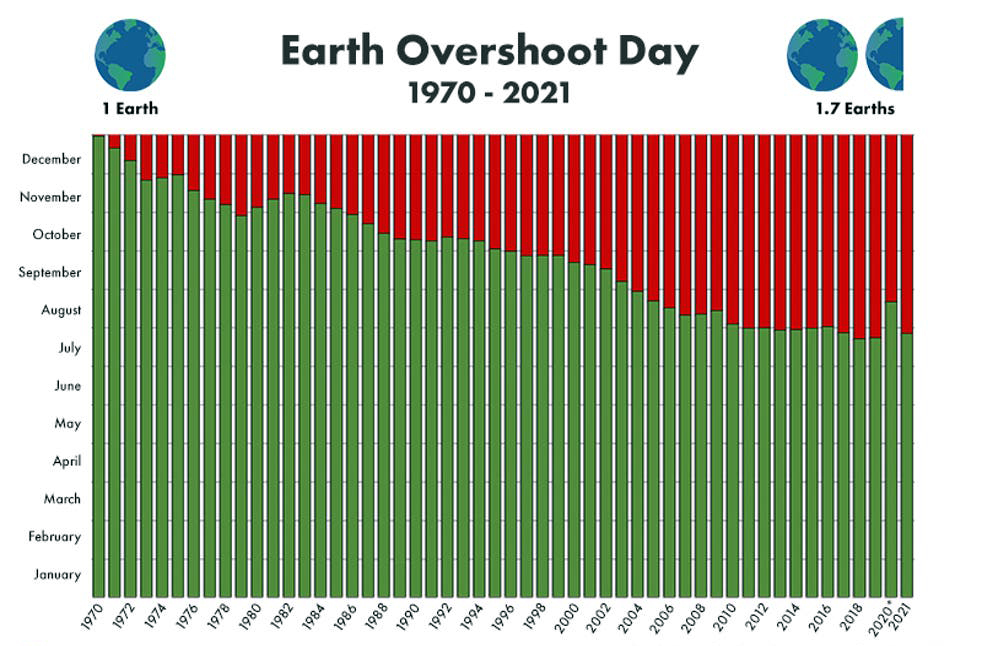Earth Overshoot Day, 2021 | 29 Jul 2021
Why in News
According to the World Wide Fund for Nature (WWF), humanity has again used up all biological resources that our planet regenerates during the entire year by 29th July, 2021.
- Humanity currently uses 74% more than what the planet’s ecosystems can regenerate — or 1.7 Earths.
- From Earth Overshoot Day until the end of the year, humanity operates on ecological deficit spending.
Key Points
- About:
- The day marks the date when humanity’s demand for ecological resources (fish and forests, for instance) and services in a given year exceeds what the Earth can regenerate in that year.
- The concept of Earth Overshoot Day was first conceived by Andrew Simms of the UK think tank New Economics Foundation, which partnered with Global Footprint Network in 2006 to launch the first global Earth Overshoot Day campaign.
- Global Footprint Network is an international non profit organization founded in the year 2003. It’s key strategy has been to make available robust Ecological Footprint data.
- The Ecological Footprint is a metric that comprehensively compares human demand on nature against nature’s capacity to regenerate.
- Earth Overshoot Day is computed by dividing the planet’s biocapacity (the amount of ecological resources Earth is able to generate that year), by humanity’s Ecological Footprint (humanity’s demand for that year), and multiplying by 365, the number of days in a year:
- (Earth’s Biocapacity / Humanity’s Ecological Footprint) x 365 = Earth Overshoot Day
- Causes:
- The prime driver was the 6.6% increase in the global carbon footprint in 2020.
- According to the World Health Organization (WHO), a carbon footprint is a measure of the impact people's activities have on the amount of carbon dioxide (CO2) produced through the burning of fossil fuels and is expressed as a weight of CO2 emissions produced in tonnes.
- There was also a 0.5% decrease in ‘global forest biocapacity’ due to a rise in deforestation of the Amazon’s rainforests.
- Some 1.1 million hectares of rainforest were lost in Brazil alone, which is home to the largest swathe of Amazonian rainforest.
- The prime driver was the 6.6% increase in the global carbon footprint in 2020.
- Predictions:
- Even worse, there would be a 43% year-over-year increase in deforestation in 2021.
- The carbon footprint of transportation will be lower this year than pre-pandemic levels.
- CO2 emissions from road transport and domestic air travel will be 5% below 2019 levels.
- CO2 emissions due to international aviation will be 33% below 2019 levels.
- But global energy-related CO2 emissions will increase 4.8% from last year as economies try to recover from the impact of Covid-19.
- Global coal use is estimated to constitute 40% of the total carbon footprint.
- Suggestions:
- A business-as-usual scenario will simply not work if the date for World Overshoot Day is to be pushed behind.
- A number of measures can be taken such as cutting down on food wastage, commercial technologies for buildings, industrial processes and electricity production and cutting down on transportation.
- Related Global Initiatives:
- The Conference of the Parties (COPs):
- For nearly three decades the United Nations (UN) has been bringing together almost every country on earth for global climate summits called COPs.
- In that time climate change has gone from being a fringe issue to a global priority.
- This year will be the 26th annual summit – giving it the name COP26 will take place in Glasgow, UK.
- Paris Agreement:
- It is a legally binding international treaty on climate change. It was adopted by 196 Parties at COP 21 in Paris in December 2015 and entered into force in November 2016.
- Its goal is to limit global warming to well below 2, preferably to 1.5 degrees Celsius, compared to pre-industrial levels.
- The Conference of the Parties (COPs):
- Some Indian Initiatives:

